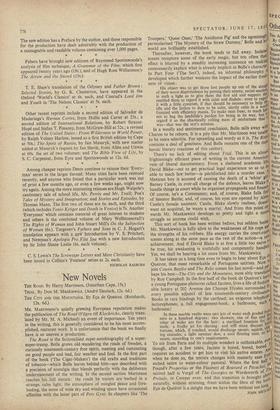New Novels
THE CITY AND THE MOUNTAINS. By Eca de Queiroz. (Reinhardt, 12s. 6d.) MR. MARTINSON'S quietly growing European reputation makes the publication of The Road (Vtigen till Klockricke, clearly trans- lated by Mr. M. A. Michael) an event of importance. Ten years in the writing, this is generally considered to be his most accom- plished, maturest work. It is unfortunate that the book we finally have is so uneven a production.
The Road is the fictionalised super-autobiography of a super- super-tramp. Bolle grows old wandering the roads of Sweden, a curiously nineteenth-century free spirit, meeting and ruminating on good people and bad, fair weather and foul. In the first part of the book (`The Cigar-Makers') the old crafts and traditions of tobacco—which Bolle leaves behind him—are described with a precision of nostalgia that blends perfectly with the deliberate understatement of the writing. In the second section Martinson reaches his full stature: the roads he travels are bathed in a strange, calm light; the atmosphere of mingled peace and fore- boding, the sense of wide sky and winding space have occasional affinities with the latter part of Peer Gynt. In chapters like 'The
By Ow lean Ernes friend Hemi a new 10a1 e,.fices .maefori Mexican boy is accused of causing the death of a 'white' girl alma Barney Castle, in over-all charge of the defence, leaves Blake t° handle things in court while he organises propaganda and finaneei to b Of course, he's a Communist; and, of course, Blake falls f 011 of fa, of Senator Battle; and, of course, his eyes are opened by Alw`.; Castle's female assistant. Castle, Blake slowly realises, does! it a want an acquittal, he wants a martyr. And from this point Orli way's wards Mr. Mankiewicz develops as pretty and tight a moral techn struggle as anyone could wish. 413 in This sort of book has been written before, but seldom better. this ( Mr. Mankiewicz is fully alive to the weaknesses of his cops and it all the strengths of his robbers. His energy carries the court-roe
scenes along at the same pace as the rest of the action—a re': achievement. And if David Blake is at first a little too naive to be true, his awakening is truthfully and competently handle° Yes, we shall be hearing a lot more from Mr. Mankiewicz.
It has taken us a long time even to begin to hear about Ego u:o Queiroz, that most remarkable of Portuguese satirists. Now 1. join Cousin Bazilio and The Relic comes his last novel—and Peed haps his best—The City and the Mountains, most ably translat by Roy Campbell. In the first half of the book de Queiroz's hero' : a young Portuguese plutocrat called Jacinto, lives a life of fasht°!, able luxury at 202 Avenue des Champs Elysdes surrounded b1' every possible adjunct of late nineteenth-century civilisation: Books in rare bindings by the cartload; an exiguous telepholc; lecturephones; a full engagement-book; a bathroom, such bathroom!
In these marble vaults were two jets of water each graded frO zero to a hundred degrees: two showers, one of fine and other of wider jets for the hair: a sterilised fountain for .tilt
ing cascades, a light summer dew, a cool floating mist, or steam, according to one's requirements.
To stir from Paris and its multiple wonders is unthinkable, eye! though, after a few years, Jacinto is bored, bored, bored. Id ,t requires an accident to get him to visit his native estates. Anto when he does so, the texture changes with masterly ease WO Troopers,' Queer Ones; 'The Assiduous Pig' and the agonisinglf particularised 'The Mystery of the Straw Dummy,' Bolle and bit
world are brilliantly established. Thereafter, however, the book tends to fall away. Isolatd scenes recapture some of the early magic, but too often their effect is blurred by a steadily increasing insistence on makini unnecessarily 'explicit what is already implicit in Bolle's character.
In Part Four (The Sect'), indeed, an informal philosophy i5 developed which further weakens the impact of the earlier fresh'
ness Of vision :
His object was to get those lost people up out of the sloullb of their worst dispiritedness by putting their enemy, social unction, in such a light as to give them the first aid and support enabled them to regard it with calm and disdain: even to regr it with a little cynicism, if that should be necessary to help to; idle and the listless to dare to be calm, alertly calm in a wodu frenzied with efficiency mania. To make man freer, to teach bill not to beg the landslide's pardon for being in its way, but t. regard it as the chaotically rolling mass of misfortune that 11
was—that was the sect's mission.
In a woolly and sentimental conclusion, Bone sails away With Charon to be reborn. It is a pity that Mr. Martinson was unable, to be more selective. For sprawling and wordy as it is, The Road contains a deal of greatness. And Bolle remains one of the moss
heroic literary creations of this century.
There's no lack of editing about Trial. This is an almotl frighteningly efficient piece of writing in the current America° vein of liberal documentary. From a sheltered academic life' David Blake—out to get practical legal experience so as to be, able to teach law-better—is pitchforked into a murder case. t'
teeth: a frothy jet for shaving: and stir' more discreet buttons, which, if touched, would discharge spouts, squirts, 074
etched satire to water-colour pastoral. Where the first half,i,e usei Pound's Propertius or the Flaubert of Bouvard et Pecuchet, 'id pro second half is Vergil of The Georgics or Wordsworth of 1.011 end Prelude, or Cowper even; and this transition is brought ab°},, trai naturally, without straining, from within the fibre of the b°° Eca de Queiroz is a delight that we have been without too loak


































 Previous page
Previous page